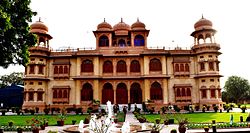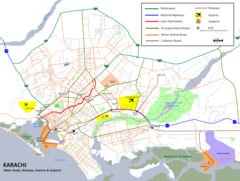Mohatta Palace
| Mohatta Palace | |
|---|---|

Mohatta Palace Museum after renovation
|
|
|
Location within Karachi
|
|
| General information | |
| Architectural style | Indo-Saracenic architecture |
| Town or city | Karachi |
| Country | Pakistan |
| Coordinates | 24°48′50″N 67°01′55″E / 24.814°N 67.032°E |
| Completed | 1927 |
| Client | Shivratan Chandraratan Mohatta |
| Technical details | |
| Structural system | Pink Jodhpur stone in combination with the local yellow stone from Gizri. |
| Size | 18,500 sq ft (1,720 m2) |
| Design and construction | |
| Architect | Agha Ahmed Hussain |
The Mohatta Palace is located in Karachi, Sindh, Pakistan. It was built in the posh seaside locale of Clifton by Shivratan Chandraratan Mohatta, a Hindu Marwari businessman from modern day Rajasthan in India,in 1927, as his summer home. The architect of the palace was Agha Ahmed Hussain. However, Mohatta could enjoy this building for only about two decades before independence, after which he left Karachi for India. He built the Palace in the tradition of stone palaces in Rajasthan, using pink Jodhpur stone in combination with the local yellow stone from Gizri. The amalgam gave the palace a distinctive presence in an elegant neighbourhood, characterised by Indo-Saracenic architecture which was located not far from the sea.
The Mohattas, belonged to the Maheshwari community, originated with Motilal Mohata (spelled Mohatta in English) who migrated in 1842 from Bikaner to Hyderabad (Deccan) and became a clerk in a shop. His four children migrated to Calcutta and became leading merchants of imported cloth. One of them, Govardhan Mohta, settled in Karachi in 1883. His older son, Ramgopal, became a scholar and author (the Hindu Gymkhana, Karachi building was named after him), and the younger son Shivrattan became an industrialist in Karachi (steel Mill, Sugar Mill etc) with branches in north India.
The palace has an area of 18,500 sq ft (1,720 m2) and its facade is trimmed with windows, stone brackets, spandrels, domes, balustrades with floral motifs and exquisite railings. There are nine domes, with a centre dome in the middle; while the windows in the front portion opening out into the garden are of blue colour and those in the rear area are arched windows with stained glass. The palace has large stately rooms designed for entertainment on the ground floor and more private facilities on the first floor, where there is a terrace provided with a shade from intense sunlight. The palace is solely made up of teak wood with a polished staircase, long corridors and doors opening within doors. The "barsati” (terrace) of the Mohatta Palace had a beautiful family temple dedicated to the Hindu God, lord Shiva.
...
Wikipedia

